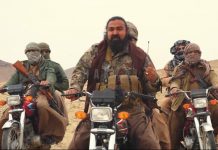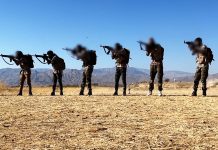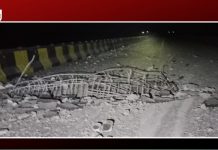By Sarang Baloch
In a recent video message, Commander-in-Chief Basheer Zeb of the Balochistan Liberation Army (BLA) is seen leading armed fighters from various units, including the Majeed Brigade, Special Tactical Operations Squad and Fateh Squad through the mountains. Equipped with modern weaponry such as the Milkor M32A1 (Mk 14) MGL, M16A2/A4 rifles, M4A1 carbines, Romanian PSL DMR, and 40mm OG-7V rockets, these freedom fighters don military gear.
Zeb’s message highlights the belief held by the BLA that Pakistan only responds to violence. He argues that when a land is occupied, resorting to armed resistance becomes a natural response for liberation, emphasizing that peaceful means like protests, sit-ins, and vocal opposition are ineffective against the oppressive tactics of tanks, bombs, and tyrannical forces.
Furthermore, Zeb addresses the claim made by Pakistani parliament members that they lack authority, inadvertently validating the BLA’s stance that violence can only be countered with violence and power can only be countered with power.
Zeb clarifies that the decision to take up arms was not driven by passion or a desire for bloodshed but rather as a means of self-defense. He justifies the armed struggle within the framework of international law and human rights, citing historical examples of nations that have attained power and championed human rights through war.
The BLA commander also underscores that fidayee attacks, bombs, and guns are integral aspects of armed struggles worldwide and should not be viewed separately. Zeb’s appearance and message in the video pose a significant threat to Pakistan and China, as they demonstrate the BLA’s progress in its mission to liberate Balochistan.
While Zeb expresses a desire for peace and aversion to war, he argues that peace can only emerge from the midst of conflict. He conveys a willingness to negotiate for the liberation of their land but emphasizes the necessity of continued resistance to reach a negotiating table.
Basheer Zeb states that the ultimate objective of the BLA is to escalate the conflict to a point where people in Punjab, Faisalabad, Lahore Pindi, Gujranwala, and Islamabad—those who identify as Pakistanis—demand an end to the war in Balochistan from the Pakistani government.
It is important to note that Zeb’s warning to Pakistan pertains to the withdrawal of their presence from Balochistan and does not explicitly threaten other parts of the country.
By showcasing numerous fighters, Zeb sends a message to those collaborating with Pakistan against the will of the Baloch people, cautioning them that their actions will yield no benefits and result only in losses.
Drawing upon the words of former BLA Commander-in-Chief Martyr General Aslam Baloch, Zeb echoes the sentiment that it is impossible to cultivate flowers in front of an enemy who attacks with bombs and tanks.
The BLA seeks to convey to the Baloch people and the world that violence cannot be resolved without a forceful response. History testifies to the fact that violence has often been met with violence, and today, those regarded as progressive, peace-loving, and champions of human rights have emerged from such struggles. While nations are often born out of wars, they eventually strive for peace.
Disclaimer: The views and opinions expressed in this article are those of the author and do not necessarily reflect the official policy or position of The Balochistan Post or any of its editors.






























